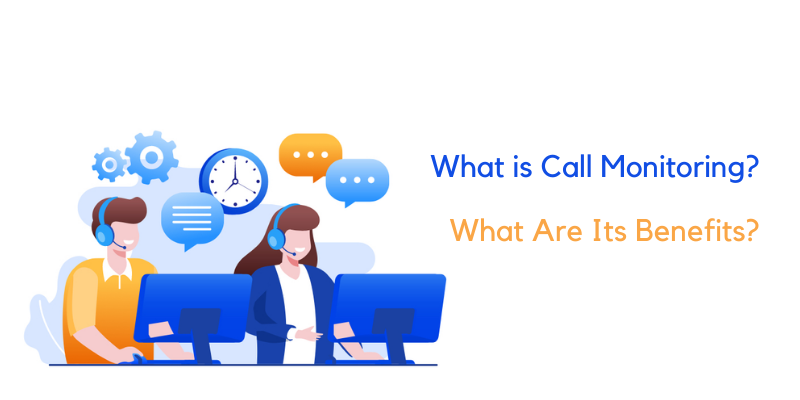
When the manager monitors and supervises the agents keeping both parallels, the agent’s performance increases greatly.
Call monitoring is one of the easiest and most lethal tools for supervisors to check the progress of the agent’s work. It gives them a consistent amount of information about agents’ activity and customers’ expectations.
Additionally, whatever the nature of business is, call monitoring provides a glance at an agent’s performance and training needs.
Generally, managers monitor the calls of the agents to ensure that the call center workflow and workforce runs effectively and provides excellent service to customers.
As I said, call monitoring is one of the best ways to check agents’ progress and productivity with objectives and planned expectations.
Let’s continue reading this blog to explore call monitoring techniques, their benefits, and how to make the most of this call quality assurance method.
What is Call Center Call Monitoring?
Simply, monitoring means observing and checking the progress or quality of (something) over a while.
In business terms, it is used as a systematic review model. In the call center industry, call monitoring refers to the process of hearing (listening) to calls to improve customer service.
So, does that mean “it is done with the only criteria to improve customer service?”
Nope! Call monitoring uses the information that happens between agents and customers, but it also helps agents, managers, and the entire company.
Various Benefits/Advantages of Call Monitoring
Let’s figure out how call monitoring helps the company itself and its stakeholders.
A) Call monitoring benefits for call center agents.
The managers or the supervisors listen to live or recorded calls to assess the quality of the customer’s services, and of course, expectations. It also gives ideas to pinpoint employers’ training needs.
- Increasing agent performance.
- Improving employee satisfaction.
- Facilitating quick interaction b/w manager and agent.
B) Call monitoring benefits for call center managers.
As you know, managers look into the facts and insights of recorded calls, this gives them a quick view of the scenario of what possibilities can be figured out to help agents to enhance customer experience.
- Identifying problems quickly and systematically.
- Assessing compliance issues.
- Focusing training efforts.
- Facilitating employee development.
- Pinpointing customer frustrations.
- Identifying inefficient and broken procedures.
D) Call monitoring benefits for customers.
Call monitoring is a process to listen to an agent’s conversation with customers and later, figure out the best way to help agents in further actions. An effective call monitoring system brings quality benefits to customers.
- Increasing quality standards.
- Improving consistency of the experience.
- Increasing service quality.
- Increasing agent effectiveness.
E) Call monitoring benefits for the call center/company.
The contact center organisation wants to gauge and sustain the customer’s experience for better results. However, call monitoring somehow helps the organization to achieve its objectives without any compromise.
- Improving the customer experience.
- Increasing first contact resolution.
- Improving call center performance.
- Delivering consistently excellent service.
- Increasing sales and service performance.
- Enhancing customer loyalty, satisfaction, and the customer experience
Now that you have gained knowledge about call monitoring benefits. Continue reading to know about call monitoring systems and tools to improve your call monitoring logic.
Also Read: What is the Connection Between ASA and Service Level?
Bonus: Call Monitoring System and Tools
Surprisingly, a cloud-based call monitoring system and the tool allow you to do more than just listen to calls. A call monitoring system or tool will offer the following features:
- Double-Listening: This features brief you to passively listen to the agent’s conversation and rectify any feedback to cater to customer service quality.
- Murmuring: Whispering can be a powerful tool designed to be used during agents’ training periods. Herein, supervisors can speak directly to the agents during phone calls with the customers in order to support, guide, and provide tips to resolve calls perfectly.
- Call Recording: It is primarily used in training processes to train and guide agents to listen to veterans record calls and learn more about selling techniques, etc.
- Call Barging: Call bargaining is a great feature to assist agents during a conversation with customers. Supervisors can provide their inputs on live calls and speak with both agents and customers.
Conclusion
Now that you’re well aware of how call monitoring is important to manage. And, when done in the right way, it brings useful and potential benefits to the agents, company, and customers. The final tip I want to give to you is to collect feedback from your agents as this extensively helps you to draft more appealing training sessions.
Thanks for reading this blog 🙂
Leave a Reply
